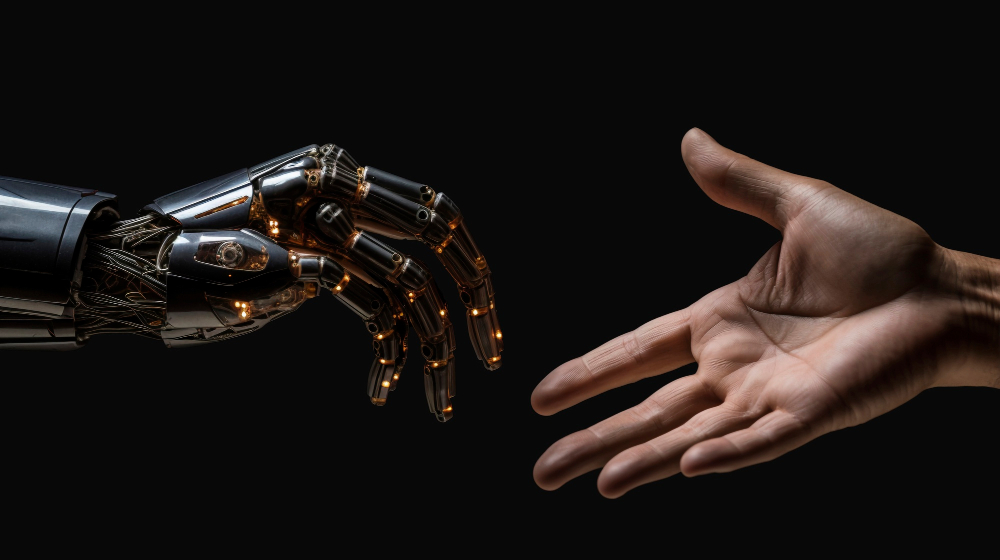Artificial intelligence (AI) has transformed many industries, and it’s no different for the security industry. By using machine learning and data analytics, AI can help improve security measures and protect us against threats. With the power to analyze vast amounts of data and detect patterns, Artificial intelligence systems can effectively stop cyberattacks, fraud, and other malicious activities.
Enhancing Security with AI
Using AI-powered security solutions comes with its own benefits. For one, teams can identify issues in real time and minimize the risk to your company or organization by quickly responding. Automating security processes will free up human resources for more strategic tasks.
Traditionally, these systems tend to struggle with the volume and complexity of cyber threats. However, AI’s unique ability to continuously monitor network traffic, log files, and other sources at all times allows it to respond to potential risks much faster by identifying anomalies and correlating data from multiple sources.
Furthermore, while humans might have a hard time keeping up with new threats as they arise or evolve, AI doesn’t. It constantly learns from new information, so you don’t have to worry about staying ahead of cybercriminals yourself.
Detecting Threats with AI
One of the main things that sets AI apart is its ability to detect unknown threats. While traditional systems rely on predefined rules and signatures for known threats, this doesn’t work well when something new happens. To solve this problem, we can use algorithms that analyze vast amounts of data instead.
Combining network traffic analysis, user behaviour analysis, and other sources in one tool makes finding patterns indicating malicious activity much more accessible.
And because these tools constantly learn from new information, like never-before-seen attacks, they’re always ready for whatever comes next.
Preventing Threats with AI
Additionally, these same tools are also great at preventing vulnerabilities! By analyzing historical data and spotting patterns again, companies can determine which parts of their systems might be at risk. This way, teams can patch holes before hackers discover them.
AI in Cybersecurity: The Good and the Bad
The use of AI in cybersecurity also has its advantages. For example, AI can analyze much more data than humans hope to do in a given time. This means that threats are detected and dealt with faster than traditional methods ever could.
Furthermore, automating security processes helps free up human resources for more strategic tasks rather than having them watch over systems constantly.
However, implementing AI into your security strategy presents some challenges, too. For one, there’s a huge lack of professionals skilled in machine learning, data analytics, and cybersecurity. So, although many organizations would love to invest in these tools, they often can’t find someone capable of using them well enough.
Another problem with artificial intelligence systems is that they may generate false positives or negatives. False positives happen when the system wrongly identifies legitimate activity as malicious, leading to unnecessary alerts and disruptions. False negatives occur when the system fails to detect a genuine threat, leaving the organization vulnerable to an attack.
Solving these problems requires collaboration between cybersecurity professionals, data scientists, and AI experts. Combined with their expertise, these teams can develop security solutions powered by robust AI that prevent threats before they become problems.
AI in Security Systems
Security systems use AI in various ways across different industries and sectors. For example, accessing secured areas can be done through AI-powered facial recognition or voice recognition systems instead of passwords and access cards. With that kind of power, security is enhanced by getting rid of traditional, vulnerable methods.
Video surveillance also benefits from automation through AI technology. Systems powered by it can analyze live video feeds and spot suspicious activities in real-time. These systems would then highlight individuals, objects, or behaviours that pose a threat so that security personnel can take action accordingly.
Threat intelligence platforms and incident response systems have both received automation. The former analyzes piles of data from a range of sources to identify potential threats and provide insights on how to combat them, while the latter automates detection and analysis containment when responding to incidents.
AI’s Impact on Data Privacy
The privacy implications surrounding Artificial intelligence are not lost on anyone either. The amount of data captured to train AI models raises eyebrows over how securely this sensitive information will be stored. It could contain personal data, transaction records or communication logs, all of which demand high levels of security protocol.
Organizations must find ways to ensure user trust and comply with regulations without compromising the security enhancements provided by machine learning algorithms. Otherwise, users may feel forced to give consent where they wouldn’t want it, just out of fear of less secure measures being taken.
Organizations should implement privacy-by-design principles when implementing AI-powered security solutions to strike a balance between security and user rights. By incorporating privacy safeguards, organizations can enhance security while respecting user privacy.
Ethical Considerations in AI-Powered Security Solutions
The more prevalent AI becomes in security systems, the greater the importance of ethical considerations. At some point, it could start impacting individual freedom and rights. Facial recognition technologies used in AI-powered access control systems may raise concerns about surveillance and invasion of privacy, for example.
Organizations must take the ethical implications of Artificial intelligence -powered security solutions seriously and use them responsibly. This means conducting impact assessments to find and manage potential privacy threats and risks to individuals rights. Companies should be transparent about their AI policies and communicate the design behind their systems.
These organizations also have the responsibility to ensure that their AI systems are fair. Inadvertent bias can occur in AI algorithms if they are trained on data that already has biases, leading to unfair results. Businesses need to examine these systems regularly for any biases or unfair practices.
AI and Security: Future Trends and Implications
The future looks bright for AI in security, as it will continue to evolve alongside artificial intelligence technology. As this happens, we can expect improved threat detection, incident response, risk management, and more. The systems will become better at analyzing data, giving companies an easier time detecting and preventing threats.
The integration of other emerging technologies with Artificial intelligence will also improve security further. By combining IoT with artificial intelligence, organizations can use connected devices to analyze potential vulnerabilities before anything goes wrong.
As great as advancements are, there are always those who want to exploit them for malicious purposes. Adversaries will likely try using AI against businesses by launching sophisticated attacks. With this knowledge, organizations need to keep up with evolving technology and stay ahead of potential threats.
Implementing AI in Your Security Strategy
To make sure your organization is using AI properly in its security strategy,
- Figure out what you need. Understand your organization’s challenges, so you know which technologies to consider investing in.
- Find the right technologies: Figure out which types of AI align with your needs best.
- Hire experts: Building a safe system requires expertise across multiple fields.
- Protect user data: Keep compliance regulations in mind while implementing privacy safeguards.
- Don’t forget upkeep. Technology changes quickly. Businesses need to be testing and auditing systems regularly.
These steps will help companies make the most of AI in their security strategies.
Conclusion: Harnessing the Power of AI for Enhanced Security
AI has given the field of security a powerful boost, letting us detect, prevent, and respond to threats much easier. By analyzing large amounts of data and finding patterns, these systems have greatly enhanced our ability to protect against fraud, cyberattacks, and other malicious activities.
AI is changing the game when it comes to threats. It helps businesses stay ahead of cybercriminals and all the other people who want to hurt them. So they can save their valuable assets.
But including AI in security does come with its own set of problems, such as the need for professionals who know what they’re doing and the risk of false positives or false negatives. Companies must talk to each other and adopt privacy-by-design principles to get around these snags.
As technology continues to advance, so do hackers and other bad guys online. That’s why organizations have to keep up with their evolving strategies and defences, too. By using AI to help them out, businesses can arm themselves against new threats in this digital age.


